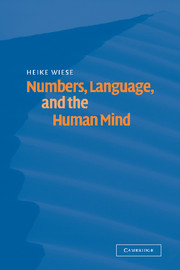Book contents
- Frontmatter
- Contents
- Acknowledgments
- Introduction
- 1 Numbers and objects
- 2 What does it mean to be a number?
- 3 Can words be numbers?
- 4 The language legacy
- 5 Children's route to number: from iconic representations to numerical thinking
- 6 The organisation of our cognitive number domain
- 7 Non-verbal number systems
- 8 Numbers in language: the grammatical integration of numerical tools
- Appendix 1 Number assignments
- Appendix 2 The philosophical background
- Appendix 3 Numerical tools: possible sets N
- Appendix 4 Conceptualisation of number assignments
- Appendix 5 Semantic representations for number word constructions
- References
- Index
3 - Can words be numbers?
Published online by Cambridge University Press: 22 September 2009
- Frontmatter
- Contents
- Acknowledgments
- Introduction
- 1 Numbers and objects
- 2 What does it mean to be a number?
- 3 Can words be numbers?
- 4 The language legacy
- 5 Children's route to number: from iconic representations to numerical thinking
- 6 The organisation of our cognitive number domain
- 7 Non-verbal number systems
- 8 Numbers in language: the grammatical integration of numerical tools
- Appendix 1 Number assignments
- Appendix 2 The philosophical background
- Appendix 3 Numerical tools: possible sets N
- Appendix 4 Conceptualisation of number assignments
- Appendix 5 Semantic representations for number word constructions
- References
- Index
Summary
The criteria-based approach characterises numbers as elements of an infinite progression that is used as a tool in cardinal, ordinal, and nominal assignments. This account gives rise to a range of possible number sequences. We are not looking for the number sequence anymore, but for sequences that are employed as numbers, sequences that fulfil the function of numbers in our daily lives. In the present chapter we explore the consequences that can be derived from this view. The criteria-based view carves out the principal area of numbers, it gives us the criteria to recognise possible number sequences; with this characterisation in hand, we can now ask which sequences it is that we use for numerical purposes: what are the ‘numbers’ we employ in number assignments, the entities that constitute the core of our cognitive number domain?
So, what we are looking for now are sequences that fulfil the three ‘number’ requirements and that are actually used in the different types of number assignments: we want a designated number sequence that can serve as the basis for the cardinal, ordinal, and nominal number concepts we will discuss in chapters 5 and 6. Let us have a look at how we come to grasp numerical tools first: which sequence is it that children initially encounter when they are exposed to numbers which sequence do they employ in numerical routines like counting?
- Type
- Chapter
- Information
- Numbers, Language, and the Human Mind , pp. 68 - 93Publisher: Cambridge University PressPrint publication year: 2003



